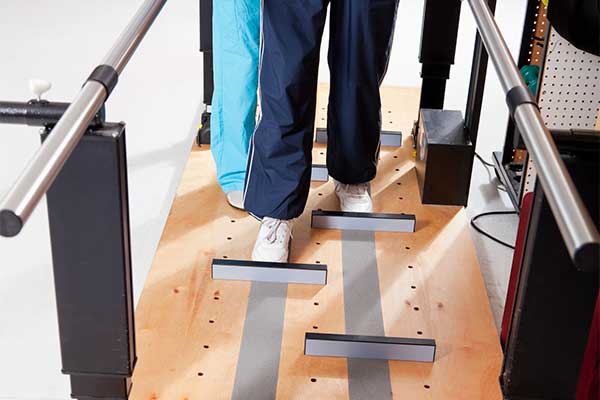Trial Finds Incorporating Music and Rhythm into Gait Training After Stroke Can Bring Benefits
Each year more than 759,000 people in the United States have a stroke, which is a leading cause of long-term disability. Walking poses a significant challenge for up to 85 percent of stroke survivors, which in turn increases risk for falls and other comorbid health conditions, impacting a person’s health and wellbeing.
To aid in walking rehabilitation, InTandemTM is n prescription neurorehabilitation system approved by the U.S. Food and Drug Administration, which autonomously delivers individualized and progressive rhythmic auditory stimulation. InTandem is developed by MedRhythms, a company with roots as a therapy services company that launched out of Spaulding Rehabilitation.
Findings from a clinical trial co-led by Spaulding Rehabilitation published February 8th in Nature Communications showed that patients who rehabilitated with InTandem were three times more likely to respond to treatment and had improvements in walking speed compared with rehabilitation without the system.
“Stroke can significantly impact a person’s ability to walk, putting them at greater risk for falls, other health conditions and poorer quality of life,” said Paolo Bonato, PhD, director of the Motion Analysis Lab at Spaulding Rehabilitation, a member of Mass General Brigham, and an adjunct associate professor of physical therapy at Boston University Sargent College. “Our trial shows that an intervention applying algorithmically controlled music as a rhythmic stimulus improves walking and ambulation by inciting and harnessing the unconscious synchronization of the auditory and motor systems.”
The randomized-controlled trial included 87 individuals at eight major rehabilitation hospitals and research institutions across the U.S., including Spaulding Rehabilitation and Boston University Sargent College.
“Walking speed is widely thought of as the functional vital sign; slow walking is associated with reduced health and quality of life,” said the trial’s principal investigator, Lou Awad, associate professor of physical therapy and director of the Neuromotor Recovery Lab at Boston University Sargent College of Health & Rehabilitation Sciences. “But faster walking can sometimes come at the cost of gait quality. There are few interventions that can help people with chronic stroke gait impairment improve both their gait speed and quality. InTandem’s use of auditory-motor entrainment to deliver an individualized intervention, has shown a remarkable ability to improve walking speed, reduce gait asymmetry, and make walking after stroke ultimately less effortful and more stable.”
Read more in Boston University’s press release.

